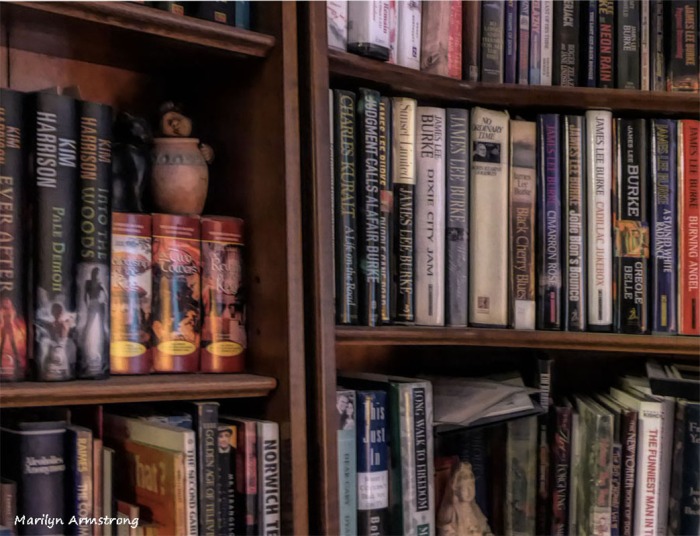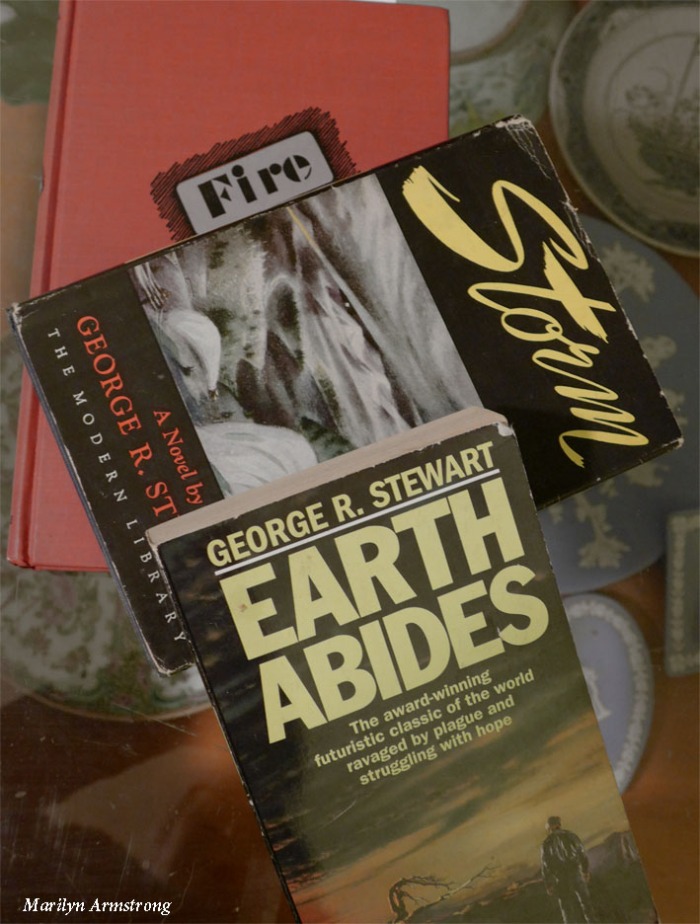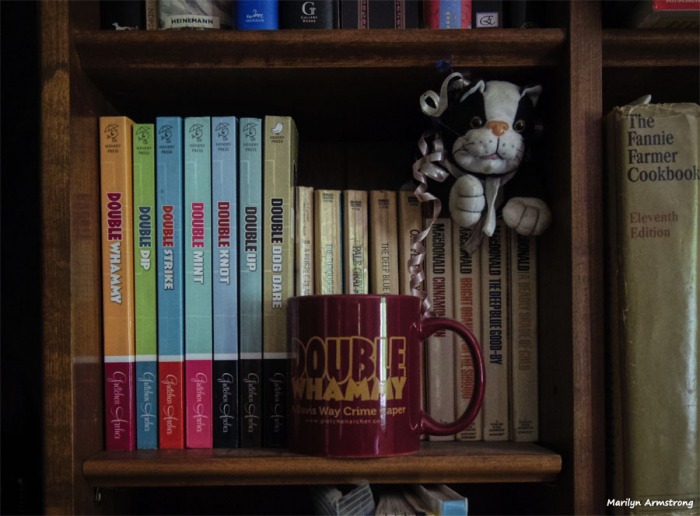Why do publishers ONLY publish potential best-sellers? Many books we read from in those old days were not wildly popular. Publishers understood a good book deserved publication, even if it wouldn’t be a bestseller. Our literature would be a very poor place if we only published the most popular genres.
 It’s true I don’t read every kind of book anymore, but I did when I was younger. I did when I was a kid and right through most of my adulthood. Only during the past few years has my taste become more specific.
It’s true I don’t read every kind of book anymore, but I did when I was younger. I did when I was a kid and right through most of my adulthood. Only during the past few years has my taste become more specific.
I read all of Dostoyevsky in one year. Aside from never remembering anyone’s’ name, I mostly enjoyed them. I couldn’t read them now — too gloomy — but when I was 15? It was great stuff! I’m also pretty sure none of those books ever made anyone’s bestseller list. Can you imagine Proust topping the best-seller list? Or Gorky?
All writers wrote more and less popular material. Not everyone likes every book or every genre, but that ought not to be the only reason a book gets published. It’s depressing for writers and very off-putting for those who have written GOOD books and know that there isn’t a publisher on earth who wants it because it isn’t in one of their “niche” areas.
When I worked at Doubleday, we published anything that was reasonably well-written. We had more than a dozen book clubs that catered to specialized audiences as well as two generic clubs. I ran (they made me do it) two libraries: American Garden Guild (I learned a lot about plants!) and Doubleday Romance Library. To this day I know more ways to say “fell in love” than you can shake a stick at.
 None of this stuff had to be bestseller material. It had an audience. The major point of book clubs what we knew there was an audience for just about everything, so we published for everyone. From military book clubs to science fiction and crime, if you wanted to read it, Doubleday published it and probably had a book club dedicated to it, too.
None of this stuff had to be bestseller material. It had an audience. The major point of book clubs what we knew there was an audience for just about everything, so we published for everyone. From military book clubs to science fiction and crime, if you wanted to read it, Doubleday published it and probably had a book club dedicated to it, too.
Many books were published because a real, live human editor felt it was worth the paper and ink.
Today, if you aren’t writing something the company’s editorial software thinks is “hot,” no human editor will so much as look at it, much less publish it.
Which is why writers end up with a boxful of computer-generated rejections. The computer scanned it, didn’t find the right buzz words, and threw it away. I finally had ONE editor willing to look at my book … and — this is true — he died a few days before he got to it.
I gave up. Not that I wrote anything really great, but it was worth at least a read or two.
It really is going to be a sad batch of literature we leave to the next generation. Good thing there are still books from earlier years to read. So many great writers will never publish or will self-publish and no one will notice them.
Okay, this is my rant of the day. It worries me that so few writers get properly published. Excellent writers are rare beasts and deserve notice. Deserve publication. And all good writers deserve to have at least one hardcover book that comes with the delicious smell of ink fresh from the press.
Categories: #Photography, #Writing, Books, Literature, Publishing



I read your book and found it thoroughly enjoyable. So what do those publishing ‘houses’ (are there even such things any more?) know? I’m relieved I was born before all this censorship (and that’s what it boils down to, isn’t it?) and automation took over. I get recommendations all the time from Kindle and Goodreads, and frankly most of them are not anything I’d be interested in reading. So I suppose the rot has set in and is growing. Sad, really sad.
LikeLike
They want very specific books and they pay so little, it’s almost not worth bothering. I think I made as much money on my non-published book than most best-selling authors made on theirs. Which really IS shocking.
They aren’t publishing good books, just ones they think might be popular. And they aren’t paying authors enough to live on, either. The result is really crappy books.
LikeLike
I think I write good books. It’s been a really demoralizing (in a way) journey. I’ve gotten letters from intelligent, educated readers telling me what my books have meant to them. Otherwise I no longer care. When I joined a fiction writing workshop and was “criticized” for writing a book that was like Tolstoy, I got the picture.
This is what I get instead of conventional publication.
***
I truly enjoyed your historical fiction “Martin of Gfenn”.
Since I was born in Switzerland, I was especially interested in your story. My niece lives in the general area of the book. Not too many novels have been written about that time, Switzerland was still in its infancy, barely separated from the Habsburg rule. Zurich joined the Swiss Confederation the first time in 1351, but was expelled and then joined again in 1450. Not too much of this was taught in school.
I felt compelled to send a print book to my brother in Switzerland. He taught latin languages and literature for many years. He just recently retired.
This is what he had to say:
. . . Dir zu danken für das Buch von M. Kennedy, Martin of Gfenn, das ich vor der Reise nach Andalusien mit grossem Vergnügen gelesen habe. Die Geschichte dieses Martin wird von M. Kennedy grossartig erzählt und die Geschichte an sich ist auch sehr stark. Ich war von diesem Roman begeistert und das kommt nicht alle Tage vor (, obwohl ich nach wie vor viele Bücher lese.)
J S, PhD
Translated:
Thank you for the book, written by M. Kennedy, Martin of Gfenn. I read it during my travels to Andalusien with great enthusiasm and enjoyment. The story of Martin is told by M. Kennedy with spellbinding language. The intensity of the story itself is exceptional. I read it with enthusiasm, which is not often the case these days, even though I’m an avid reader.
LikeLike
I actually went hunting for “The Price” while I was waiting for my transthoracic echo exam … so of course, they took me early. I have been doing more reading than I usually do because so many books are only available in print … and I promised to review them because those with publishers are finding they aren’t doing anything for them … and paying them almost nothing. I think I made more on my self-published book than they made from publications that were best-sellers! it’s shocking, but I should not be surprised. Publishers have ALWAYS been thieves. Anyway, if I can find “the price” I’ll read it and if I can’t, I’ll just buy it.
LikeLike
I can send you another one 😊
LikeLike
The problem is, it went into “docs” but they’ve eliminated the section for documents, so if I didn’t get it as a “real Amazon download,” it vanishes. I can find it on my computer in Amazon, but not on my Kindle, which is where I read. I’ve just read two actual print books and I’m exhausted. I’m also having many problems with my eyes. I can’t see much out of my left eye and only from the right side of my right eye. The rest looks like a shining mesh that makes seeing anything difficult. That’s what all this testing and all this medication are about. I finally realized that I have to do something about it because I really can’t see properly … and it isn’t that I need new eyeglasses. It’s the eyes. Or maybe, the brain. It’s MUCH easier on the Kindle because of the backlighting.
LikeLiked by 1 person
Even worse that actual rejection is often hearing NOTHING back from submissions. It’s difficult to remain motivated about submitting to publishers!
LikeLike
That’s also true for job hunting. You go through five interviews and taking up a whole week … and don’t even get a call or a postcard to say they’ve chosen someone else.
LikeLiked by 1 person
So true.
LikeLike
It is a sad commentary on our literary present. Your book was well worth publishing and I did enjoy it. The other sad fact is that fewer people are buying actual copies of these books. A lot of this literature will be lost to the ether.
LikeLike
It already IS being lost.
LikeLiked by 1 person
that’s why I treasure my books….
LikeLike
Fifteen on a steady diet of Dostoyevsky? I’m impressed. I suspect no writer really knows whether he/she is a good writer. Some of the worst become published authors while many good ones get discouraged by being out of sync with market-driven (i.e., # of projected sales) publishing world.
In our time, I look to the historians for wisdom and for the things that make for depth of character and the building of a sustainable, just, and compassionate society. Fortunately for all of guys, David McCullough broke through the corporate publishers’ wall, and he still with manual typewriter! Can you imagine? David is a throw-back whose pages are not throw-aways. If he were submitting his work for the very first time with no previously published, well-selling books on his letter of introduction, I have to wonder whether David would be left with no alternative but to self-publish. He never would. He’s a lot like a blogger I know in Massachusetts. He’s not into promoting himself. He writes because that’s what he does, on a manual typewriter!!! Both the motive and the method are old school.
LikeLike
I have a whole shelf full of his and Doris Kearns-Goodwin’s books. I LOVE history. And those two are really amazing authors.
But Connie Willis who writes “science fiction,” but really it’s history through the looking glass by placing a modern person in an earlier time, Her “time travel” books are more history than sci-fi. They have a lot to say about humanity and our relationships to our world and each other. Two of her books: “Blackout” and “All Clear” were about the blitz in London. They are remarkable, gripping books. I learned a lot more about that time from those two books than any history books I ever read. Definitely a distance from Mrs. Miniver. She spent a lot of time in London interviewing people who survived the blitz and in some places, she used their stories just the way they told them. All her books are great and some are absolutely hilarious and they all have a moral point to make. She’s won every award she can and another one of my favorite author getting on in years and not writing much anymore. But those two — and maybe Bellwether and The Doomsday Book … and also a lot of really excellent short stories. I think you would like her a lot. “All Seated On the Ground” … well … aside from being extremely funny, it’s also extremely pointed. She never forgets WHY she is writing.
LikeLike
I think MOST of our great writers — fiction and non-fiction — would never even get a read by an editor today, much less publication.
LikeLike
It must be hard for a writer to get rejections but to get rejected by a computer would be gut-wrenching.
LikeLike
It is demoralizing. You realize you’ve been rejected by SOFTWARE. No human involved.
LikeLiked by 1 person
No wonder people self publish but they would not reach the wider audience. Like most things publishing is now about the money and not about quality or wanting to be known for good writers.
LikeLike
It’s really a damned if you do, damned if you don’t thing.
LikeLiked by 1 person
This is true. I always have this thought that every book has a story to tell and a lesson to learn. I honestly grab a book for the sake of reading it no matter what the genre is. I just have this open mind that there is something to learn from it. I want to publish books but looking for publishers can be tough especially if you won’t be noticed. 😁😁
LikeLike
I used to read everything, but I don’t have as much time to read as I used to. I spend more time writing and taking pictures, so I choose more carefully and hope I’ve chosen well. Still, when i was younger, including MUCH younger, I read absolutely everything and I’m glad I did. You do learn a lot. Among other things, you learn what you really like!
LikeLiked by 1 person
I like to browse through new releases. Choosing a book to read is part of the adventure. I must admit that Amazin suggestions help or having a glance at certain lists like the Sunday or Nee York Times to keep up with new releases and authors.
LikeLike
I have read a lot and a lot of my favorite authors either aren’t writing much now or have retired, so it gets harder to find things I really love. Terry Pratchett was a real FIND. I think I spent almost a whole year reading his books. I may read them again.
LikeLiked by 1 person